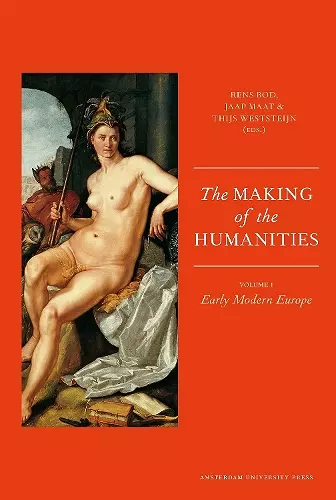The Making of the Humanities
Volume 1 - Early Modern Europe
Thijs Weststeijn editor Rens Bod editor Jaap Maat editor
Format:Paperback
Publisher:Amsterdam University Press
Published:15th Oct '10
Currently unavailable, and unfortunately no date known when it will be back

This book is the first step towards the development of a comparative history of the humanities. Specialists in philology, musicology, art history, linguistics, literary theory, and other disciplines highlight the intertwining of the various fields and their impact on the sciences. This first volume in the series The Making of the Humanities focuses on the early modern period. Different perspectives reveal how the humanities developed from the ‘liberal arts’, via the curriculum of humanistic schools, to modern disciplines.
The authors show in particular how discoveries in the humanities contributed to a secular world view, pointing up connections with the scientific revolution. The main themes are: the humanities versus the sciences; the visual arts as liberal arts; humanism and heresy; language and poetics; linguists and logicians; philology and philosophy; the history of history. Contributions come from a selection of internationally renowned European and American scholars, including Floris Cohen, David Cram, and Ingrid Rowland. The book offers a wealth of insights for specialists, students, and those interested in the humanities in a broad sense.
Anja-Silvia Goeing, in Renaissance Quarterly, Vol. 65, No. 3 (Fall 2012): 'The strength of this book lies in the way it connects = well-known profiles to lesser-known figures, and in its discussion of those fields, including the visual arts, linguistics, and history, that had scarcely been defined among the artes liberales in the humanism of the fifteenth and sixteenth centuries. As this book shows, the significance of these disciplines for the academy grew immensely in the seventeenth and eighteenth centuries. The chapters examine the history of disciplines that today are regarded as separate and distinct. = The purpose of this book is to answer two questions: first, the question of what - what kind of organizing principles did academic knowledge deploy in different early modern settings?; and second, the question of how - how did academic knowledge in Europe come to be what it is in modern times? The authors' focus on the non-sciences is intended to fill a lack that the editors see when compared to the vast and existing literature written about the history of the sciences. The book is therefore most valuable to academics studying the history of European academic knowledge.'
ISBN: 9789089642691
Dimensions: unknown
Weight: 731g
400 pages